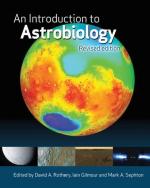|
This section contains 3,662 words (approx. 13 pages at 300 words per page) |

|
Astrobiology is a new interdisciplinary science that studies the origin, evolution, distribution, and destiny of life in the cosmos. Other terms that have been used to describe the search for life beyond Earth include exobiology, exopaleontology, and bioastronomy. Astrobiology is a broadly based, interdisciplinary science that embraces the fields of biology and microbiology, microbial ecology, molecular biology and biochemistry, geology and paleontology, space and gravitational biology, planetology, and astronomy, among others.
The development of astrobiology as a discipline began in the early 1990s with the recognition of a growing synergy between various sciences in seeking answers to the question of extraterrestrial life. The National Aeronautics and Space Administration (NASA) promoted the development of astrobiology by funding a research institute (the NASA Astrobiology Institute, or NAI), which consists of interdisciplinary teams of scientists from fifteen separate institutions in the United States, including both government laboratories and universities. Important scientific...
|
This section contains 3,662 words (approx. 13 pages at 300 words per page) |

|


